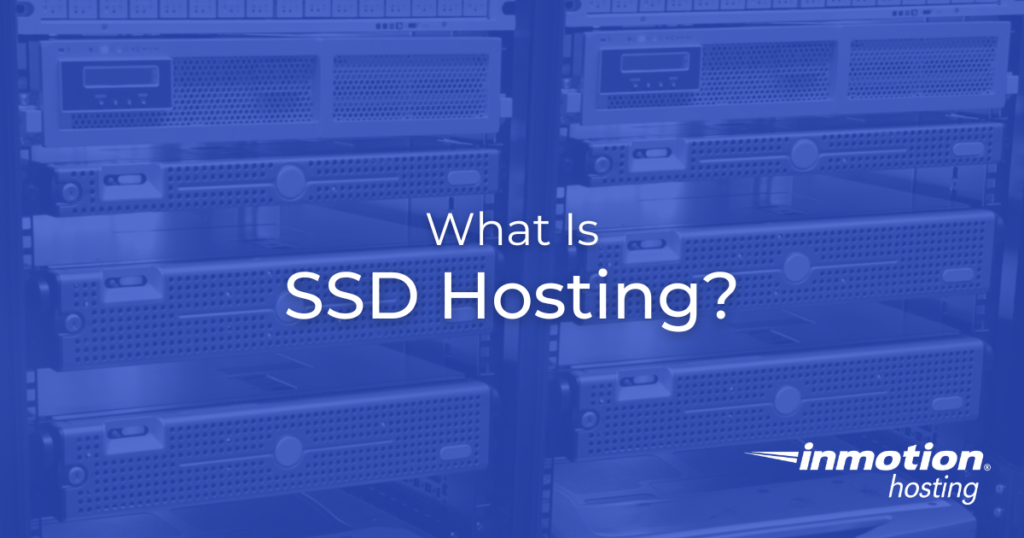[ad_1]
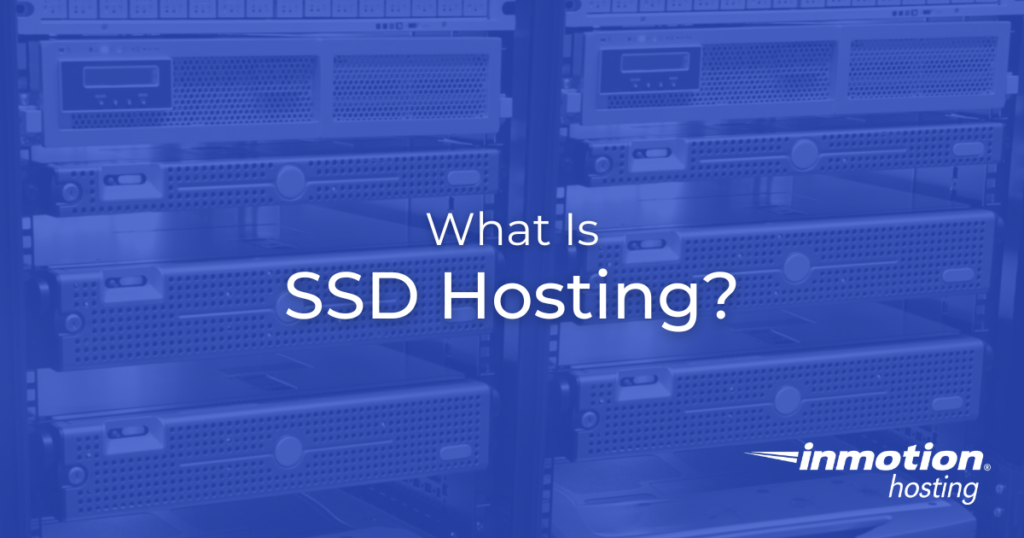
If you are in the market for web hosting, you may have heard the term “SSD hosting” or “solid state drive hosting” thrown around. But what is SSD hosting, and why is it important for your website? In this article, we’ll dive into what SSD hosting is and why it’s the best choice for your website.
What is SSD Hosting?
SSD hosting is a type of web hosting that uses solid state drives instead of traditional hard disk drives. Solid State Drives, or SSDs, have no mechanical parts and use interconnected flash memory chips to store data, as opposed to the spinning disks used by hard disk drives. This makes SSDs faster and more reliable than HDDs, making them an excellent choice for web hosting.
The memory mechanism in a Solid State Drive is much like RAM, with the difference being that data is saved in nonvolatile flash memory. “Nonvolatile” means that the data saved in the memory will not disappear when the device is turned off. Computers of all types normally have two types of memory: volatile and nonvolatile memory. Volatile memory is usually called RAM, while the non-volatile memory has traditionally been the hard drive or other media storage types (e.g. USB thumb drives and writeable optical media such as DVDs and CD-ROMs).
Why Use SSDs for Your Web Server?
The main advantage of using an SSD server is its performance, increased speed, reliability, and energy efficiency.
Servers with SSDs have several advantages over those without. Their data can be accessed faster, so websites hosted on servers with SSDs will load faster and experience less downtime due to hardware failure.
Servers without SSDs use traditional hard disk drives, which are slower and less reliable than SSDs. While these servers may be cheaper, they can lead to slower website load times and more frequent downtime due to hardware failure.
SSD Hosting Benefits
There are many benefits to using SSD hosting for your website – whether it’s for a business, personal project, or web app. Simply put, SSDs are faster, experience less downtime, and more energy-efficient. Websites hosted on servers with SSDs are easier to backup and migrate because the SSDs are less prone to hardware failure, which means that you are less likely to lose data due to a failed drive.
Increased Speed
One of the primary advantages of SSD hosting is that it offers faster load times for websites. With SSD, a server can handle more overall disk read/write requests before becoming unstable. So even during peak times of usage, the backed up I/O requests can be served. Faster read/write speeds allow websites to load faster, especially the random read/write operations you typically find in a server environment.
Did you know that SSDs are 30% faster at opening files and booting up an operating system compared to HDDs? A server with SSD hosting takes around 10-13 seconds to reboot, while an HDD can take 30-40 seconds.
That may not seem like a lot, but when you consider server resets, that 40-second reboot can be extremely frustrating.
One in four visitors will give up on a site if it takes greater than four seconds to load.
Google also penalizes sites with slow load times by impacting search ranking. Let’s look at how a slow loading website affects your bottom line. For example, if an e-commerce site makes $100k per day, a one-second page delay could cost you upwards of $2.5 million in lost sales per year.
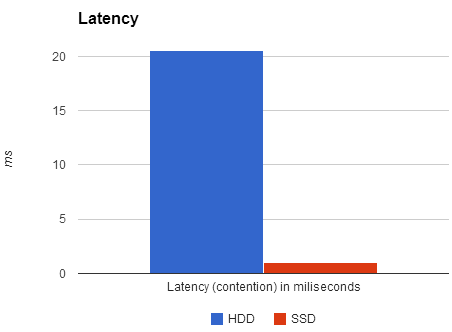
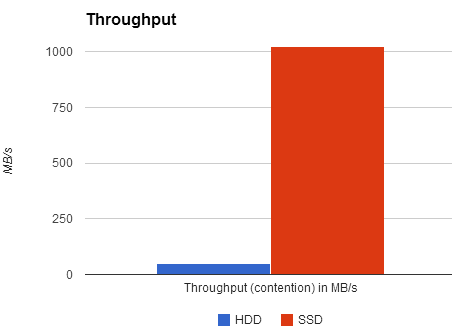
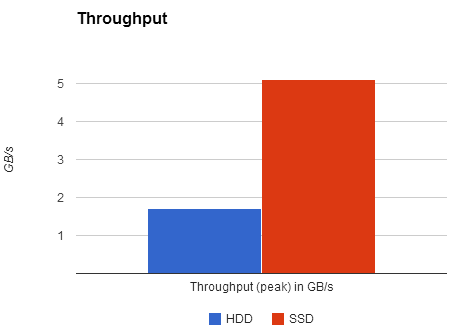 SSDs are 20 times faster than a normal HDD when it comes to latency when a server is busy with I/O requests.When a server is busy with I/O requests, a standard HDD might only be able to push through about 5% as much data as a SSD.When a server is not busy with I/O requests, a standard HDD can still only typically push through about 35% as much data as a SSD.
SSDs are 20 times faster than a normal HDD when it comes to latency when a server is busy with I/O requests.When a server is busy with I/O requests, a standard HDD might only be able to push through about 5% as much data as a SSD.When a server is not busy with I/O requests, a standard HDD can still only typically push through about 35% as much data as a SSD.Improved Reliability and Dependability
One of the most significant advantages of SSD hosting is its improved reliability and dependability. Unlike HDDs, SSDs have no physical moving parts, making them less prone to catastrophic and mechanical failures. This means that SSDs are more dependable over time, and businesses can rely on them to keep their data safe and secure.
SSDs can maintain data integrity for over 300 years and recover lost data more easily in the event of a failure. SSD servers often give warnings before failure occurs, allowing the hosting company to make the necessary changes before a failure happens. HDDs, on the other hand, rarely give warnings before the drive fails.
More Energy Efficient
SSDs are more energy-efficient than traditional hard disk drives, producing less friction and resulting in a lower energy bill. This, in turn, helps keep cooling costs down. Hosting companies can create more affordable packages for customers by reducing these costs, positively impacting their bottom line.
Reduced Latency
Latency is the time it takes for a server to respond to a client’s request. With SSD hosting, latency is reduced, resulting in faster loading websites that improve user experience, leading to more conversions and sales.
Faster Recovery Times
In the event of catastrophic failure, SSDs allow for easy recovery of lost data. Unlike traditional hard disk drives (HDDs), SSDs have no moving parts, making them more reliable and less prone to mechanical failure. HDD recovery is often more expensive and less guaranteed, making SSDs the preferred choice for businesses that rely on data integrity, greater uptime, and reduced costs in the event of a failure.
Why SSD Hosting is the Best Choice for Your Website
In conclusion, SSD hosting offers numerous benefits over traditional HDD hosting solutions. With faster recovery times, increased speed and durability, improved reliability, reduced latency, and easy website backups and migration, it’s easy to see why SSD hosting is quickly becoming the standard for high-performance web hosting solutions.
InMotion Hosting provides SSDs for all hosting accounts at no additional cost. Choose InMotion Hosting’s SSD hosting for improved website performance and increased reliability.
Related
[ad_2]
Source link
